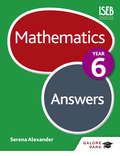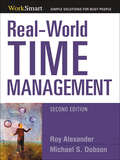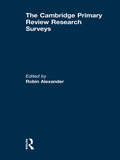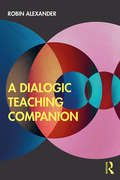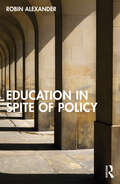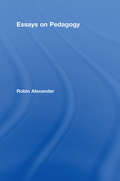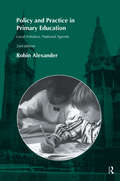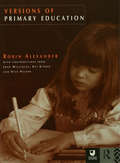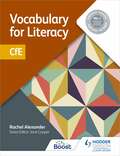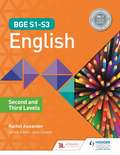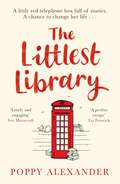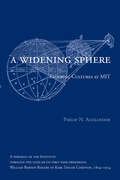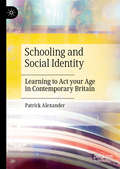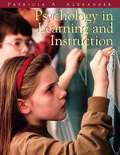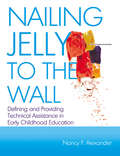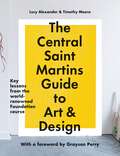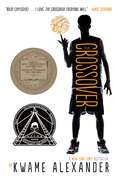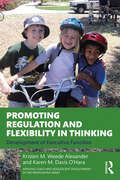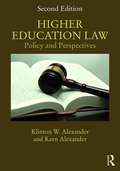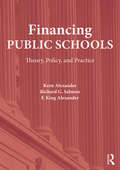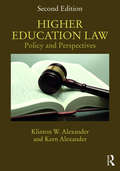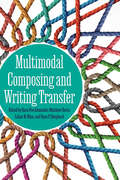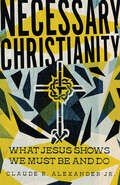- Table View
- List View
Mathematics Year 6 Answers
by Serena AlexanderFeatures the complete set of answers to the exercises in Mathematics Year 6, as well as a selection of photocopiable worksheets to save you time and enable you to identify areas requiring further attention.The book includes diagrams and workings where necessary, to ensure pupils understand how to present their answers, as well as photocopiable worksheets at the back of the book.Also available from Galore Park www.galorepark.co.uk:- Mathematics Year 6- Mathematics Year 5- Mathematics Year 5 Answers- 11+ Maths Practice Exercises- 11+ Maths Revision Guide- 10-Minute Maths Tests Workbook Age 8-10- 10-Minute Maths Tests Workbook Age 9-11- Mental Arithmetic Workbook Age 8-10- Mental Arithmetic Workbook Age 9-11
Real-World Time Management (WorkSmart)
by Roy Alexander Michael S. DobsonIn this instructive guide to time management, author Michael Dobson provides tips, techniques, and commonsense advice that will give anyone better agency over his or her time and significantly increase productivity. Real-World Time Management does this by offering readers valuable tips on how to: set priorities; stay on track; keep a closed-door policy; avoid interrupters; and reduce stress. You’ll also learn how to handle distractions, stop procrastinating, delegate tasks, deal with meetings, and manage time effectively while traveling.Most of us dream about having a few extra hours in our day for taking care of business, relaxing, or engaging in the activities we most enjoy. But how can we make the most of our time when it seems as though there aren’t enough hours in the day? Now newly updated, this enlightening and essential guide will help leaders and frontline employees alike wrangle and order their time--no matter how hectic their lives may seem.
The Cambridge Primary Review Research Surveys
by Robin Alexander Christine Doddington John Gray Linda Hargreaves Ruth KershnerThe Cambridge Primary Review Research Surveys is the outcome of the Cambridge Primary Review – England’s biggest enquiry into primary education for over forty years. Fully independent of government, it was launched in 2006 to investigate the condition and future of primary education at a time of change and uncertainty and after two decades of almost uninterrupted reform. Ranging over ten broad themes and drawing on a vast array of evidence, the Review published thiry-one interim reports, including twenty-eight surveys of published research, provoking media headlines and public debate, before presenting its final report and recommendations. This book brings together the twenty-eight research surveys, specially commissioned from sixty-five leading academics in the areas under scrutiny and now revised and updated, to create what is probably the most comprehensive overview and evaluation of research in primary education yet published. A particular feature is the prominence given to international and comparative perspectives. With an introduction from Robin Alexander, the Review’s director, the book is divided into eight sections, covering: children’s lives and voices: school, home and community children’s development, learning, diversity and needs aims, values and contexts for primary education the structure and content of primary education outcomes, standards and assessment in primary education teaching in primary schools: structures and processes teaching in primary schools: training, development and workforce reform policy frameworks: governance, funding, reform and quality assurance. The Cambridge Primary Review Research Surveys is an essential reference tool for professionals, researchers, students and policy-makers working in the fields of early years, primary and secondary education.
A Dialogic Teaching Companion
by Robin AlexanderBuilding on Robin Alexander’s landmark Towards Dialogic Teaching, this book shows how and why the dialogic approach has a positive impact on student engagement and learning. It sets out the evidence, examines the underpinning ideas and issues, and offers guidance and resources for the planning, implementation and review of effective dialogic teaching in a wide range of educational settings. Dialogic teaching harnesses the power of talk to engage students’ interest, stimulate their thinking, advance their understanding, expand their ideas and build and evaluate argument, empowering them for lifelong learning and for social and democratic engagement. Drawing on extensive published research as well as the high-profile, 5000-student trial and independent evaluation of Alexander’s distinctive approach to dialogic teaching in action, this book: Presents the case for treating talk as not merely incidental to teaching and learning but as an essential tool of education whose exploitation and development require understanding and skill; Explores questions of definition and conceptualisation in the realms of dialogue, argumentation and dialogic teaching, revealing the similarities and differences between the main approaches; Discusses evidence that has enriched the debate about classroom talk in relation to oracy, argumentation, student voice and philosophy for children as well as dialogic teaching itself; Identifies what it is about dialogic teaching that makes a difference to students’ thinking, learning and understanding; Presents the author’s rationale and framework for dialogic teaching, now completely revised and much expanded; Proposes a professional development strategy for making dialogic teaching happen which, like the framework, has been successfully trialled in schools; Lists resources from others working in the field to support further study and development; Includes an extensive bibliography. Robin Alexander’s A Dialogic Teaching Companion, like its popular predecessor Towards Dialogic Teaching, aims to support the work of all those who are interested in the quality of teaching and learning, but especially trainee and serving teachers, teacher educators, school leaders and researchers.
Education in Spite of Policy
by Robin AlexanderA national system of education cannot function without policy. But the path to practice is seldom smooth, especially when ideology overrules evidence or when ministers seek to micromanage what is best left to teachers. And once the media join the fray the mixture becomes downright combustible. Drawing on his long experience as teacher, researcher, government adviser, campaigner and international consultant, and on over 600 published sources, Robin Alexander expertly illustrates and illuminates these processes. This selection from his recent writing, some hitherto unpublished, opens windows onto cases and issues that concern every teacher. Part 1 tackles system-level reform. It revisits the Cambridge Primary Review, an evidence-rich enquiry into the condition and future of primary education in England, which challenged the UK government’s policies on curriculum, testing, standards and more besides. Here the reform narratives and strategies of successive governments are confronted and dissected. Part 2 follows the development of England’s current National Curriculum, exposing its narrow vision and questionable use of evidence and offering a more generous aims-driven alternative. This section also investigates the expertise and leadership needed if children are to experience a curriculum of the highest quality in all its aspects. Part 3 reaches the heart of the matter: securing the place in effective pedagogy of well-founded classroom talk, a mission repeatedly frustrated by political intervention. The centrepiece is dialogic teaching, a proven tool for advancing students’ speaking, thinking, learning and arguing, and an essential response to the corrosion of democracy and the nihilism of ‘post-truth’. Part 4 goes global. It investigates governments’ PISA-fuelled flirtations with what they think can be adapted or copied from education elsewhere, examines the benefits and pitfalls of international comparison, and ends with the ultimate policy initiative: the United Nations mission to ensure ‘inclusive and equitable quality education’ for all the world’s children. Education in Spite of Policy is for all those teachers, students, school leaders and researchers who value the conversation of policy, evidence and practice, and who wish to explore the parts of education that policy cannot reach.
Essays on Pedagogy
by Robin AlexanderSeven authoritative contributions to the emerging field of pedagogy and to comparative, cultural and policy studies in education. A must for those who want to do more than merely comply with received versions of ‘best practice’. Pedagogy is at last gaining the attention in English-speaking countries which it has long enjoyed elsewhere. But is it the right kind of attention? Do we still tend to equate pedagogy with teaching technique and little more? Now that governments, too, have become interested in it, is pedagogy a proper matter for public policy and official prescription? In Essays on Pedagogy, Robin Alexander brings together some of his most powerful recent writing, drawing on research undertaken in Britain and other countries, to illustrate his view that to engage properly with pedagogy we need to apply cultural, historical and international perspectives, as well as evidence on how children most effectively learn and teachers most productively teach. The book includes chapters on a number of themes, expertly woven together: the politicisation of school and classroom life and the trend towards a pedagogy of compliance; the benefits and hazards of international comparison; pedagogical dichotomies old and new, and how to avoid them; how education and pedagogy might respond to a world in peril; the rare and special chemistry of the personal and the professional which produces outstanding teaching; the scope and character of pedagogy itself, as a field of enquiry and action. For those who see teachers as thinking professionals, rather than as technicians who merely comply with received views of ‘best practice’, this book will open minds while maintaining a practical focus. For student teachers it will provide a framework for their development. Its strong and consistent international perspective will be of interest to educational comparativists, but is also an essential response to globalisation and the predicaments now facing humanity as a whole.
Policy and Practice in Primary Education
by Robin AlexanderDetailed accounts of two influential initiatives of the 1990s, whose educational and political lessons remain highly relevant: systemic and pedagogic reform in one of Britain’s largest cities, and the controversial ‘three wise men’ government enquiry into primary teaching to which it led. Alexander's controversial and widely-read report on primary education in Leeds has now been revised as a major study of policy initiatives in primary education and their impact on practice. The book examines an ambitious programme of local reform aimed at improving teaching and learning in the primary schools of one of Britain's largest cities. It addresses important questions about children's needs, the curriculum, classroom practice and school management. When first published, Robin Alexander's report was hailed as `seminal' and `the most important document since Plowden' but it was also quoted and misquoted in support of widely opposed political and media agendas. This new edition retains Part I from the first edition, detailing the impact of Leeds LEA's programme for educational reform. However, it also provides a totally new and greatly extended Part II, which gives an insider's account of the sequel to the Leeds report - the government's 1992 'three wise men' report. There is also a new introduction.
Versions of Primary Education
by Robin AlexanderGetting to the heart of primary education: six contrasting studies of teachers, teaching, learning and classroom discourse, all set in a historical frame. Contains extended lesson transcripts for re-analysis. The five studies in this book span the tumultuous period from the mid 1980s to the mid 1990s. This was a time when the dominant educational ideas and practices of the previous two decades were being questioned and primary teachers were being catapulted from the Plowden era into the very different ethos of the National Curriculum.The first four studies portray the ideas, practices and dilemmas of primary teaching at different points during this period. They also exemplify different approaches to classroom research, though all of them stay close to the interactions between teacher and child which are central to learning. They thus raise educational questions which are perennial and fundamental, rather than tied to policy or fashion. The final study uses a broader brush to provide a historical framework for understanding the particular blend of change and continuity which characterises English primary education as a whole.
Vocabulary for Literacy: CfE
by Rachel Alexander Jane CooperSyllabus: CfE (Curriculum for Excellence, from Education Scotland) and SQALevel: BGE (S1-S3) and Senior Phase (National 4/5)Subject: LiteracyWords are powerful. Enrich your vocabulary and you will be able to speak, listen, read and write more effectively.Explore important aspects of vocabulary - decoding words, easily confused words, groups of words and new words - through simple explanations, strategies, progressive activities and revision tasks.This is the only book available for the Scottish curriculum that includes a dedicated chapter on inclusive language, to show students how their words have the power to make everyone feel accepted and understood.Vocabulary for Literacy equips pupils with the building blocks for success in exams, coursework and adult life, and facilitates literacy development across the curriculum.> Understand the essentials. Key concepts that pupils need to remember are introduced in 'explanation' boxes.> Put theory into practice. 'Building', 'Strengthening' and 'Extending' tasks enable pupils to apply their knowledge and skills, through a mix of solo and group work.> See the big picture. 'Crossover' boxes make links to prior and future learning, knowledge and skills, encouraging pupils to approach vocabulary holistically.> Avoid common errors. 'Mistake' boxes contain examples and tips to ensure that pupils get it right in their own speech and writing.> Check and consolidate. 22 printable A-Z activity sheets (available for free online) can be used in school or at home for revision and extra practice."There is a proven link between an improved vocabulary and increased attainment in Scottish schooling."Rachel Alexander
BGE S1–S3 English: Second and Third Levels
by Rachel AlexanderSyllabus: CfE (Curriculum for Excellence, from Education Scotland) and SQALevel: BGE S1-3: Second & Third LevelSubject: EnglishBuild, strengthen and extend pupils' skills with this creative and collaborative approach to English. As they progress through a rich selection of text extracts, active learning tasks and end-of-chapter assessments, pupils will enjoy developing their Talk and Listening, Writing, Critical Reading and RUAE skills throughout S1-S3.Covering all CfE Second and Third Level Benchmarks for Literacy and English, this ready-made and fully differentiated BGE course puts progression for every pupil at the heart of your curriculum.- Boost confidence and competence in literacy and language: Active learning tasks are clearly marked as 'building', 'strengthening' and 'extending' so students can see how their skills are improving- Meet the needs of each pupil in your class: Carefully chosen text extracts and scaffolded activities support pupils working towards Level 2 and help you close the attainment gap- Effectively check and assess progress: Formative assessments at the end of each chapter help you monitor progression against the Experiences & Outcomes and Benchmarks (with additional assessments in the separate Planning & Assessment Pack)- Lay firm foundations for National qualifications: Covering all skills across Talk and Listening, Writing, Critical Reading, and Reading for Understanding, Analysis and Evaluation will set pupils up for success at National 5 and beyond
BGE S1–S3 English: Second and Third Levels
by Rachel AlexanderSyllabus: CfE (Curriculum for Excellence, from Education Scotland) and SQALevel: BGE S1-3: Second & Third LevelSubject: EnglishBuild, strengthen and extend pupils' skills with this creative and collaborative approach to English. As they progress through a rich selection of text extracts, active learning tasks and end-of-chapter assessments, pupils will enjoy developing their Talk and Listening, Writing, Critical Reading and RUAE skills throughout S1-S3.Covering all CfE Second and Third Level Benchmarks for Literacy and English, this ready-made and fully differentiated BGE course puts progression for every pupil at the heart of your curriculum.- Boost confidence and competence in literacy and language: Active learning tasks are clearly marked as 'building', 'strengthening' and 'extending' so students can see how their skills are improving- Meet the needs of each pupil in your class: Carefully chosen text extracts and scaffolded activities support pupils working towards Level 2 and help you close the attainment gap- Effectively check and assess progress: Formative assessments at the end of each chapter help you monitor progression against the Experiences & Outcomes and Benchmarks (with additional assessments in the separate Planning & Assessment Pack)- Lay firm foundations for National qualifications: Covering all skills across Talk and Listening, Writing, Critical Reading, and Reading for Understanding, Analysis and Evaluation will set pupils up for success at National 5 and beyond
The Littlest Library: The most heartwarming, uplifting and romantic read for 2021
by Poppy Alexander'Friendship, community and a little bit of romance - what's not to love?' Mandy Baggot'Books, bats and romance...a perfect escape. I loved spending time with the characters of Middlemas.' Liz Fenwick'My first Poppy Alexander book but definitely not my last. What a lovely, engaging, perceptive story The Littlest Library is' Sue Moorcroft'Five of the biggest stars for The Littlest Library. I thoroughly enjoyed spending some time with Jess and her phone box full of books.' Catherine Miller'I loved everything about this book. It is filled with so much warmth, gentle humour and some very heart touching moments' Sue FortinIt's only the beginning of her story...Jess Metcalf is perfectly happy with her quiet, predictable life - it's just the way she likes it. But when her beloved grandmother passes away and she loses her job at the local library, her life is turned upside-down.Packing up her grandmother's books, she moves to a tiny cottage in a charming country village. To her surprise, Jess finds herself the owner of an old red telephone box, too - and she soon turns it into the littlest library around!It's not long before the books are borrowed and begin to work their magic - somehow, they seem to be bringing the villagers together once more...Maybe it's finally time for Jess to follow her heart and find a place to call home?
A Widening Sphere: Evolving Cultures at MIT
by Philip N. AlexanderHow MIT's first nine presidents helped transform the Institute from a small technical school into a major research university.MIT was founded in 1861 as a polytechnic institute in Boston's Back Bay, overshadowed by its neighbor across the Charles River, Harvard University. Harvard offered a classical education to young men of America's ruling class; the early MIT trained men (and a few women) from all parts of society as engineers for the nation's burgeoning industries. Over the years, MIT expanded its mission and ventured into other fields—pure science, social science, the humanities—and established itself in Cambridge as Harvard's enduring rival. In A Widening Sphere, Philip Alexander traces MIT's evolution from polytechnic to major research institution through the lives of its first nine presidents, exploring how the ideas, outlook, approach, and personality of each shaped the school's intellectual and social cultures. Alexander describes, among otherthings, the political skill and entrepreneurial spirit of founder and first president, William Rogers; institutional growing pains under John Runkle; Francis Walker's campaign to broaden the curriculum, especially in the social sciences, and to recruit first-rate faculty; James Crafts, whose heart lay in research, not administration; Henry Pritchett's thwarted effort to merge with Harvard (after which he decamped to the Carnegie Foundation for the Advancement of Teaching); Richard Maclaurin's successful strategy to move the institute to Cambridge, after considering other sites (including a golfclub in Brighton); the brilliant, progressive Ernest Nichols, who succumbed to chronic illness and barely held office; Samuel Stratton's push towards a global perspective; and Karl Compton's vision for a new kind of Institute—a university polarized around science and technology. Through these interlocking yet independent portraits, Alexander reveals the inner workings of a complex and dynamic community of innovators.
Schooling and Social Identity: Learning to Act your Age in Contemporary Britain
by Patrick AlexanderThis book examines the nature of age as an aspect of social identity and its relationship to experiences of formal education. Providing a new and critical approach to debates about age and social identity, the author explores why age remains such an important aspect of self-making in contemporary society. Through an ethnographic account of a secondary school in the south-east of England, the author poses three principal questions. Why are schools in English organised according to age? How do pupils and teachers learn to ‘act their age’ while at school? Ultimately, why does age remain such an important and complex organising concept for modern society? Cutting across lines of class and gender, this timely book will be of interest to students and scholars of self-making and identity in educational contexts, and others interested in how schooling socialises young people into categories of age as the foundational building blocks of modern society.
Psychology in Learning and Instruction
by Patricia A. AlexanderTextbook on the psychological aspects of teaching.
Nailing Jelly to the Wall: Defining and Providing Technical Assistance in Early Childhood Education
by Nancy AlexanderFor experts in the field of early care and education, defining and providing technical assistance can be as difficult as nailing jelly to the wall.Learn to effectively coach, mentor, and train early childhood teachers and administrators with guided experiences, strategies, and activities to provide technical assistance in specific program areas like parent involvement, science, outdoor play, music. and art.Nailing Jelly to the Wall is written for: * early childhood consultants offering an objective, outside view of what is needed to improve a program * mentors serving as a role model for others who are building a career in early childhood * coaches helping others in the field of early childhood improve their skills and knowledge by providing resources, demonstrations, and guidance * program administrators working with their own staff to provide professional development and guidance
Central Saint Martins Foundation: Key lessons in art and design
by Lucy Alexander Timothy Meara Central Saint MartinsExplore and expand your creative skill set with The Central Saint Martins Guide to Art & Design, fully updated in 2023 in line with the current course, with a new afterword by Rathna Ramanathan, Head of Central Saint Martins.Guided by key lessons from college tutors, you'll learn to expand your creative abilities and develop your own visual language. Exclusive projects from the world-class Central Saint Martins Foundation Diploma in Art and Design will inspire your experiments and unlock your potential across four key areas: communication design, fashion and textiles, fine art and three-dimensional design. No matter which discipline you choose to pursue, this book will help you discover who you want to be and set you on the path to achieving it.'Do you care about heartbreaking beauty, fresh new ideas, astounding craftsmanship, ingenious solutions, the tingle of a shocking image? Would you make art even if it wasn't your job? Then this is the book for you' - Grayson Perry
Central Saint Martins Foundation: Key lessons in art and design
by Lucy Alexander Timothy Meara Central Saint MartinsExplore and expand your creative skill set with The Central Saint Martins Guide to Art & Design, fully updated in 2023 in line with the current course, with a new afterword by Rathna Ramanathan, Head of Central Saint Martins.Guided by key lessons from college tutors, you'll learn to expand your creative abilities and develop your own visual language. Exclusive projects from the world-class Central Saint Martins Foundation Diploma in Art and Design will inspire your experiments and unlock your potential across four key areas: communication design, fashion and textiles, fine art and three-dimensional design. No matter which discipline you choose to pursue, this book will help you discover who you want to be and set you on the path to achieving it.'Do you care about heartbreaking beauty, fresh new ideas, astounding craftsmanship, ingenious solutions, the tingle of a shocking image? Would you make art even if it wasn't your job? Then this is the book for you' - Grayson Perry
The Crossover: A Basketball Novel (The Crossover Series #1)
by Kwame Alexander<P>2015 Newbery Medal Winner <P>2015 Coretta Scott King Honor Award Winner <P>"With a bolt of lightning on my kicks . . .The court is SIZZLING. My sweat is DRIZZLING. Stop all that quivering. Cuz tonight I'm delivering," announces dread-locked, 12-year old Josh Bell. <P>He and his twin brother Jordan are awesome on the court. But Josh has more than basketball in his blood, he's got mad beats, too, that tell his family's story in verse, in this fast and furious middle grade novel of family and brotherhood from Kwame Alexander. <P>Josh and Jordan must come to grips with growing up on and off the court to realize breaking the rules comes at a terrible price, as their story's heart-stopping climax proves a game-changer for the entire family. <P><b>A New York Times Bestseller</b>
Promoting Regulation and Flexibility in Thinking: Development of Executive Function (Applying Child and Adolescent Development in the Professions Series)
by Kristen M. Alexander Karen M. O’HaraThis concise guide introduces the importance of executive function for social and emotional well-being and effective learning. It clearly explains the research that underpins important topics such as working memory, organization, self-regulation, attention and cognitive flexibility, and how they apply to the real-world settings in which we work with children, adolescents, and families. This engaging book offers knowledge and strategies for improving executive function together with an understanding of its relevance for diverse populations.The authors use the most current research to provide an overview of what executive function is, how it develops, and how it works in coordination with other developmental factors to promote regulation and flexibility in thinking. Chapters contain detailed information about the biological and physiological foundations for brain development and emotion regulation, as well as advances in cognition, emotion, and social relationships. Making the research accessible to all with evidence-based writing and theory-to-practice applications, the book provides applications with career contexts and interviews and case studies that bring the book to life.Designed to introduce professionals, advocates, and parents to the importance of executive function in human development, this book is for all those working with children and young people. It will also be of interest as an introductory text for those new to the field or as a way to learn to apply developmental principles in practice.
Higher Education Law: Policy And Perspectives
by Klinton Alexander Kern AlexanderThis fully revised and updated textbook weaves law into its historical, political, and sociological context, while providing clear explanation of the law as it applies to American colleges and universities. This text draws exclusively on federal and state cases emerging from campuses and includes helpful pedagogical elements--such as chapter outlines, questions for discussion, side bars, text boxes, research aids, and summation of law--to equip readers with the tools and knowledge to effectively respond in an environment of increasing litigation. Addressing a gap in the literature, this new edition provides a comprehensive and accessible understanding of the latest laws relevant to higher education and student affairs administrators.
Financing Public Schools: Theory, Policy, and Practice
by Kern Alexander Richard G. Salmon F. King AlexanderFinancing Public Schools moves beyond the basics of financing public elementary and secondary education to explore the historical, philosophical, and legal underpinnings of a viable public school system. Coverage includes the operational aspects of school finance, including issues regarding teacher salaries and pensions, budgeting for instructional programs, school transportation, and risk management. Diving deeper than other school finance books, the authors explore the political framework within which schools must function, discuss the privatization of education and its effects on public schools, offer perspectives regarding education as an investment in human capital, and expertly explain complex financial and economic issues. This comprehensive text provides the tools to apply the many and varied fiscal concepts and practices that are essential for aspiring public school administrators who aim to provide responsible stewardship for their students. Special Features: "Definitional Boxes" and "Key Terms" throughout chapters enhance understanding of difficult concepts. Coverage of legal, political, and historical issues provides a broader context and more complex understanding of school finance. Offers in-depth exploration of business management of financial resources, including fiscal accounting, school facilities, school transportation, financing with debt, and the nuances of school budgeting techniques.
Higher Education Law: Policy and Perspectives
by Kern Alexander Klinton W. AlexanderThis fully revised and updated textbook weaves law into its historical, political, and sociological context, while providing clear explanation of the law as it applies to American colleges and universities. This text draws exclusively on federal and state cases emerging from campuses and includes helpful pedagogical elements--such as chapter outlines, questions for discussion, side bars, text boxes, research aids, and summation of law--to equip readers with the tools and knowledge to effectively respond in an environment of increasing litigation. Addressing a gap in the literature, this new edition provides a comprehensive and accessible understanding of the latest laws relevant to higher education and student affairs administrators. New In This Edition: Explanation and streamlining of old case law. New cases throughout covering recent developments in: student loan debt, student safety, Internet speech, affirmative action, discrimination, Greek life, issues relating to new technology, non-faculty employees, campus police, and athletics. Revised explanation on student and college costs. Expanded examination of the idea of academic freedom
Multimodal Composing and Writing Transfer
by Kara Poe Alexander Matthew Davis Lilian W. MinaMultimodal Composing and Writing Transfer explores transfer across various contexts of multimodal composing, extending the early conversations connecting multimodality to writing. Contributors address how writing transfer theories intersect with multimodal composing and present methods for facilitating transfer across modes and media, offering insight into how writers can learn to compose when they encounter familiar modes in new contexts. Over the past two decades the concepts of multimodal composing and writing transfer have grown and reshaped the nature of writing studies, but rarely have the ways in which these areas overlap been studied. This collection shows how this shift in writing studies has been mutually informative, covering a wider range of contexts for multimodality and writing transfer than just in first-year composition courses. It places composition teaching practices and multimodal research in conversation with learning transfer theory to provide an in-depth examination of how they influence one another. Multimodal Composing and Writing Transfer develops these intersections to connect multimodal composition and writing practices across a wide array of fields and contexts. Scholars across disciplines, postsecondary writing teachers, writing program administrators, writing center directors, and graduate students will find this collection indispensable.
Necessary Christianity: What Jesus Shows We Must Be and Do
by Claude R. Alexander Jr.We live in a world of options, where we might do this or that if we feel like it. But for followers of Jesus, certain things are not optional, but necessary.mustmustmustmustLife in God is less about what you could do, and more about what you must do. Contrary to the life of the optional, accidental, and haphazard, the believer is called to live with a sense of divine necessity. No maybes about it.
